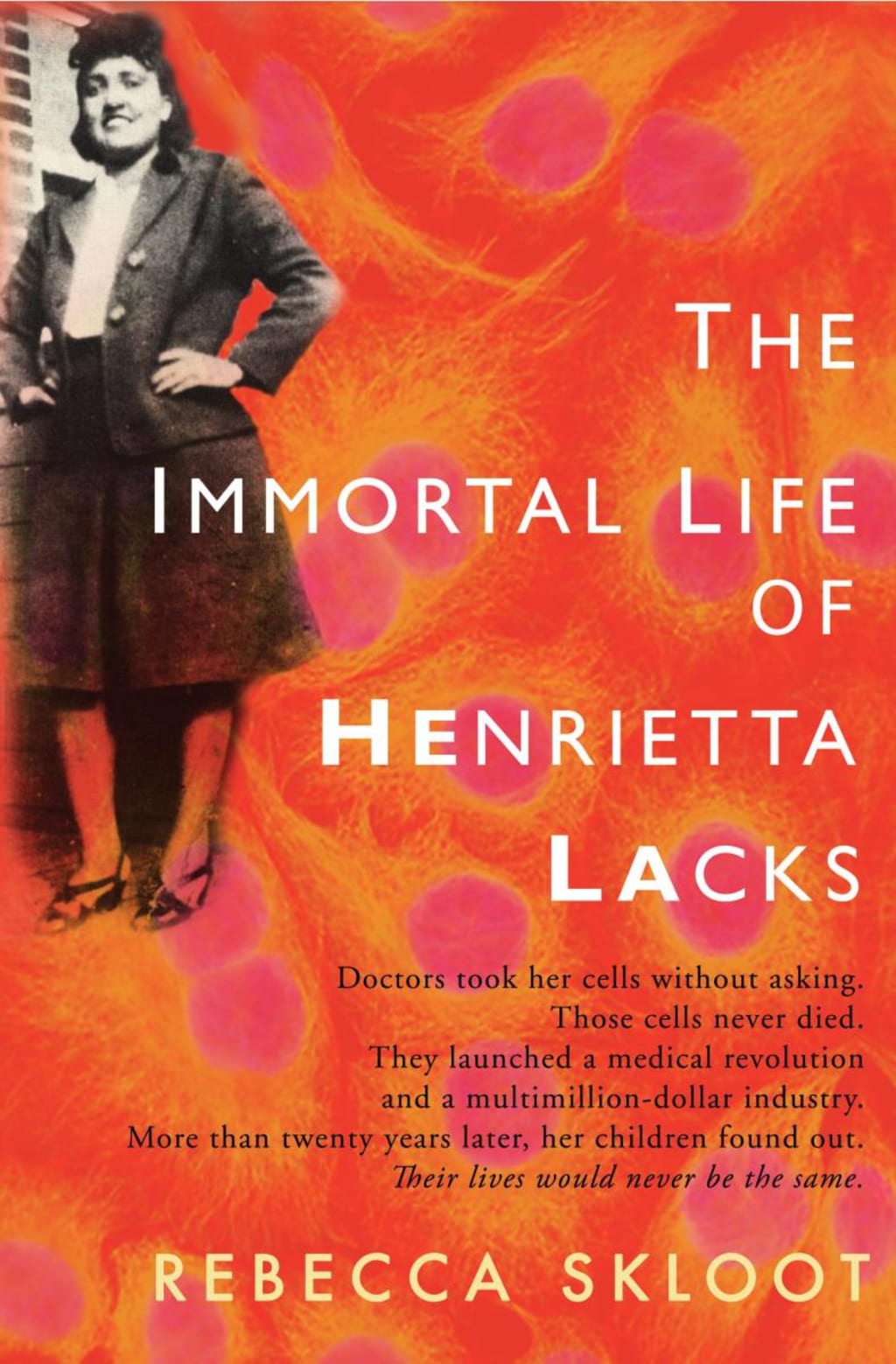Book Review: The Immortal Life of Henrietta Lacks
HeLe Cells, Secrecy, and Money

The Immortal Life of Henrietta Lacks is a book about a person and a discovery that changed the face of science. Henrietta Lacks was a simple woman born in a time of Jim Crow laws that limited African Americans in society. This is a story of a woman with cervical cancer whose cancer cells were taken and made into a multimillion-dollar research industry. Henrietta lived with hardship and died young buried in an unmarked grave. This book includes her voice retelling her history, the voices of her family who were in the dark to what happened, and facts about those who used her cells without her permission to shape medical research that changed lives around the world.
The Immortal Life of Henrietta Lacks was published in 2010 in hardback by Crown and in 2011 in paperback by Broadway Books. It has been awarded numerous awards and was on the New York Times best sellers list for hardback and paperback for a total of one-hundred and seventy-five weeks. The sources used in writing this book were journals, interviews with family members, medical records, and the few photographs the author could find. This would be considered all primary sources using the voices of the people directly affected by an establishment that did not take responsibility for their actions.
The author of this book is Rebecca Skloot. She is a narrative science writer for numerous publications. Her writings have appeared in The New York Times Magazine; O, The Oprah Magazine; Discover; as well as other publications. She has also been a correspondent for WNYC’s Radiolab and PBS’s Nova ScienceNOW. Ms. Skloot also co-edited with her father, Floyd Skloot, The Best American Science Writing 2011. The Immortal Life of Henrietta Lacks is the first book the author has written, and it took 10 years for Ms. Skloot to research and write.
Ms. Skloot has degrees in biological sciences and creative nonfiction writing. She has taught at the University of Memphis, the University of Pittsburgh, and New York University. She is also the founder and president of the Henrietta Lacks Foundation, a non-profit scholarship organization.
The Immortal Life of Henrietta Lacks describes a woman’s life born into a family of former slaves and growing up on the tobacco plantation her family had lived on for generations. It tells of her great-grandfather being the owner of her great-grandmother and the generations after. Readers might wonder why they are reading about the lives of blacks during the first half of the 20th century, but to see the whole picture of the medical advances after WWII readers must see all sides of history to understand.
The book starts with a history of Henrietta and her husband Day who were first cousins raised by their grandfather, Tommy Lacks. As, the author weaves the story of Henrietta the reader sees the trials black populations had to live in with laws passed to separate them from whites. Medicine was hard to come by without traveling, and doctors did not explain about diagnoses and treatments. In 1941, Henrietta and Day married and moved soon after from Virginia to Pittsburg, PA with their children. Ten years passed before Henrietta felt and discovered there was something wrong. She gave birth to her fifth child and was soon diagnosed with cervical cancer. While a white woman would have had a choice of where she would go “colored” women could only go to certain places that had “colored” wards.
She was soon scheduled for treatment, but with her 6th grade education she did not understand nor was it explained to her with her being colored what the procedure was or what her prognoses would be. She signed a sheet agreeing to the procedure, but not a form stating the doctor could use her or her tissues for experiments.
During this time, many blacks were being used for medical experiments without it being explained why and the damage it would do. The Tuskegee Syphilis study is one experiment that happened to black men with syphilis. They were told they were being treated for “bad blood” when in actuality they were being observed for the effects of syphilis, and later dying from the disease. (Grey, Fred)
While she was under anesthesia, cells from her tumor were removed and sent to a lab in the hospital she was in, John Hopkins. George Gey was a medical researcher trying to grow cells that would stay alive. Since cells usually died within a few days after culturing, research had to be done quickly. He was trying to create a cell colony that would keep growing to help in research. Henrietta’s cancer cells did just that, and within weeks George Gey had enough cultured cells to give to other researchers. Henrietta and her family did not know this, and it would be twenty years before they found out.
HeLa, as the cells are known, are worldwide even today. Mr. Gey soon was able to send cells around the country and then the world. These cells were soon used by researchers to aid the polio vaccine, atomic bomb research, cell research, DNA research, etc. If a development happened using cells in the research HeLa cells were involved in some way. The demand overwhelmed George Gey’s labs, and soon another lab was created at the Tuskegee Institute to manufacture HeLa cells in bulk. The same institute that was doing syphilis experiments also was the first lab to manufacture HeLa in large quantities for Polio vaccine research.
This book details the short life of Henrietta who died at age 31 and her family who, because of their lack of education and color, were left in the dark for so long. The Immortal Life of Henrietta Lacks takes the reader on a journey of love, life, sorrow, death, and into labs across the globe that financially benefitted from HeLa cells.
Henrietta’s family were uneducated and poor when she was alive, but her five children grew to live in the same way she did. They struggled to understand what happened to their mother, and they fought addictions, prison, hard lives, and racism. Henrietta and her husband were first cousins, and issues with learning and hearing were struggles their children would never overcome. They wanted to learn, but no one would explain in words they could understand until Ms. Skloot came along and wanted the world to know who Henrietta was.
This book will frustrate the reader as they see people use others who were poor and uneducated to advance their own careers. But as the reader reads they will see the generations unfold as Henrietta’s life is a major influence to her great-grandchildren as they take steps to educate themselves. Many have graduated high school and gone to college. In 2009, a great-granddaughter was working on her master’s degree, and her college essay was on her great-grandmother Henrietta Lacks.
The Immortal Life of Henrietta Lacks will inspire the reader as it educates them, opens their eyes, and brings compassion to the forefront. But it will also bring to point the importance of equality, education, and ethical practices in the world of medicine and medical research. This book is interesting to read, and it was written by an educated white woman about an uneducated black woman and her family both wanting the truth of unethical practices to be heard by the world. The example of this book is inspiring that working together can bring great things and heal many wounds if only we all could see this truth.
The wrote this review in 2016 for a class I was taking. I have a hard time reading it because of the strong emotion and the frustration for this family. The book is a good read but if you feel others' emotions, especially when reading this will stir them up for you.
About the Creator
Erika Wood
I am a student of life just wandering my way thru the maze and enjoying every turn. Visit my sight as I write about the state I live in and other random thoughts that come my way.






Comments
There are no comments for this story
Be the first to respond and start the conversation.